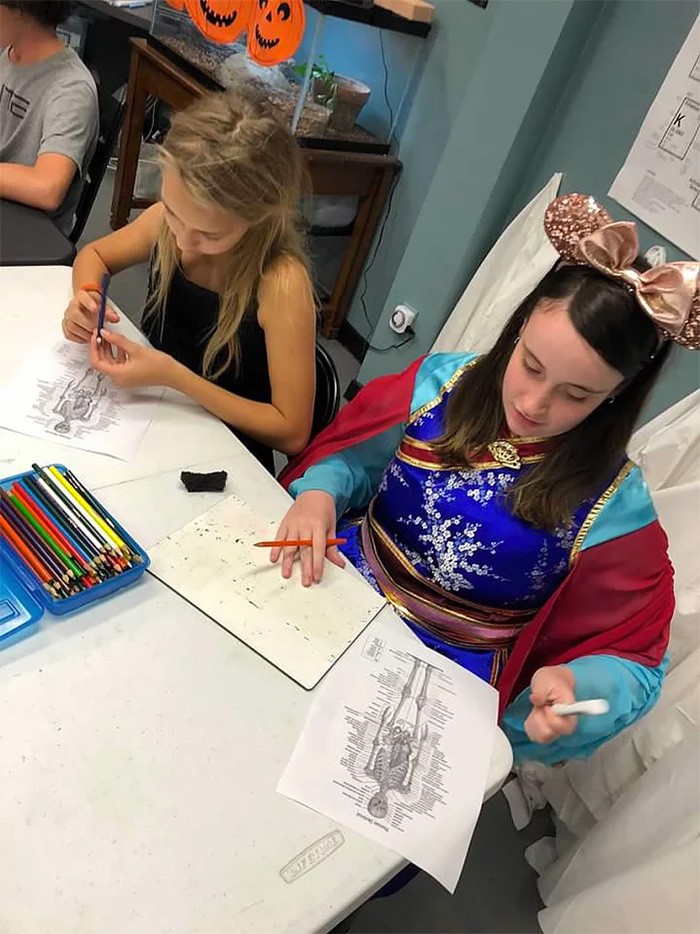As we have now entered the holiday season, it seems the right time to share about something that makes us feel especially grateful.
Here at Indi-ED, we take time to be grateful everyday. Our students understand that by intentionally focusing on what you are grateful for, you are likely to lead a happier and more successful life.
As we plan our month of December to include more random acts of kindness, opportunities to connect, and to spread joy-we are reminded of how fortunate we are because we get to BALANCE like this all of the time.
Take Halloween for example. Over the course of two days, our students were able to TRULY balance work and play, silly and serious, academic and emotional growth.
For our Halloween festivities this year, we chose the movie Coco as our theme. Partly for the fun decoration possibilities, but the main reason was for the underlying themes and morals present in the movie. The focus on understanding your family history, the Day of the Dead traditions, and following your passions. The focus on honoring those loved ones you have lost, by keeping their memory alive through happy stories.


So on Halloween day, we were able to celebrate the usual Halloween silliness with costumes (some inspired by Coco) during the first part of our day. There were definitely lots of laughs- see the T-Rex below getting his supplies for class. But even dressed in costume, our students were able to focus on their academic work all day- see the giraffe below discuss some math problems with Mrs. Morrison.


We also had different themed lessons for our afternoon- during which some of our Indi-ED parents joined in on the fun to teach a Spanish lesson! Our students also learned about art, history, music, and the skeletal system.
There were no major distractions because of any costumes. Some of them even rehearsed for their showcase presentations in costume and were still completely professional. Very happy and proud teacher moments.
Unlike other schools, after we celebrated Halloween, the next day we celebrated the Day of The Dead.
This may seem dark at first glance, we expect our students to think deeply. So we simply provided an opportunity for them to do just that. With their parents permission first and while giving the students the option to participate or not of course.
Culturally, is the way we celebrate death the way they would like to? How do other cultures around the world do it? What feels right when processing big emotions and life events to them? Why do we tend to run from it and bottle our emotions up when we will all be faces with it? Why don’t schools provide a safe place to help students learn how to process those emotions and find a silver lining and coping skills?
After our students completed their work that morning, we came together to simply share about our families.
This is when the real magic happened.
What we thought would be a brief discussion, turned into many of our students, and us teachers, opening up and sharing very meaningful stories that we probably never would have otherwise. We showed photos and mementos. The students were actively listening to each other and they were respectful. We laughed and we cried-together.


It was incredible to see these young people display such bravery by expressing themselves and their emotions. They displayed vulnerability by opening up. What made it even more special was when I realized they were able to do all of this because they know they are in a caring, safe environment where they don’t have to worry about being judged. They don’t have to worry what others will think of them- if their voice wavers or they cry. They got to see their teachers model this vulnerability as well. We were all able to open up and share about our families, sharing sad and happy stories alike.
To us, we did not see this long discussion as time wasted, or time taken away from our curriculum. To us, this experience was invaluable and it was to the kids as well. All but one wanted to continue this tradition next year and so we will.
Our students are boosting their emotional and social intelligence during experiences like these. These types of intelligences are equally as important as academic intelligence (if not more so).
Being able to process, express, and reflect on emotions are all real-life skills that will serve our students into adulthood. They are skills that should always be practiced, and unfortunately this isn’t done in most schools or even homes.
At Indi-ED, we laugh together, learn together, and cry together. There isn’t an uneven load of strictly academics that neglects the ‘real’ parts of life. We are able to truly experience the balance everyday.
For this we are grateful.


